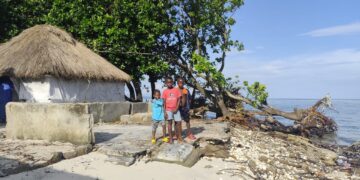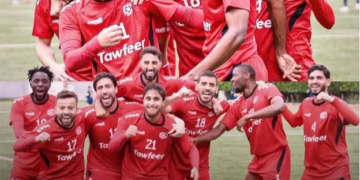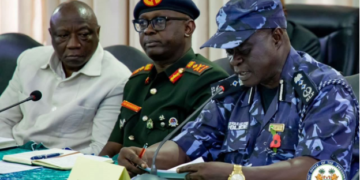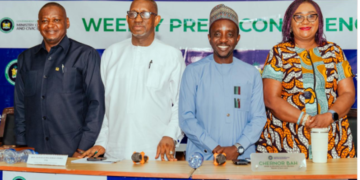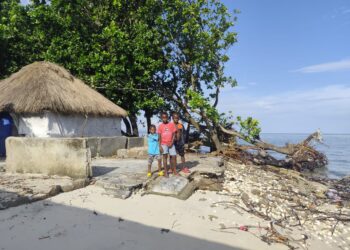By Alpha Amadu Jalloh
At the Civic Day Series organized by the Ministry of Information and Civic Education, a moment froze time when a mother cried. She stood trembling, her voice quivering under the weight of pain that only a mother’s heart could bear. Before a hall filled with government officials, ministers, journalists, and policy experts, she went down on her knees and begged:
> “Papa Gofment, una help wi! Wi pikin dem dae die lek fly pan Kush!”
The room fell silent, not out of empathy, but out of guilt, indifference, and cowardice.
I watched that scene unfold, and something inside me broke. It was not just her tears that hurt me; it was the hollow look on the faces of those who were supposed to listen. Days later, a video went viral showing the Speaker of Parliament ranting and downplaying the dangers of Kush and its devastating effects on our youth population. In that same video, he asked mockingly, “Who bewitched Sierra Leone?” What an irony! The very man who sits at the heart of lawmaking, watching a nation rot in silence, now wonders who cursed it. He ranted about patriotism, blaming citizens for the decay that his very inaction has deepened. And I thought to myself, how blind must one be not to see that the witchcraft killing Sierra Leone is greed, corruption, and indifference at the top.
A Mother’s Plea, A Nation’s Shame
When a mother cries in public, it is not an act of weakness; it is the highest form of desperation. It means she has exhausted every private prayer, every whispered hope, every sleepless night watching her son disappear into the fog of addiction.
She cried because she has seen her child’s eyes sink into hollows of despair. She cried because she has watched her son, once full of promise, now trembling for another dose of death.
And yet, those seated at the high table, men and women who swore oaths to protect this nation, could not even look at her. Not a single one rose to hold her hand or to assure her that the government would act.
What have we become as a nation when the tears of a mother no longer move us?
We say in our faith that “Heaven lies under the feet of our mothers.” Yet in Sierra Leone, we have turned those sacred feet into rivers of sorrow. We let them cry while we continue to talk politics, organize summits, and make empty promises. Tell me, how will we ever find heaven when all we do is make the mothers cry?
The Silence of the Youthful Ministers
Our so-called youthful ministers, the very ones who parade themselves as symbols of the new generation, sat motionless as if drug addiction was an abstract concept, not a plague swallowing the dreams of an entire nation.
Where is your voice, young ministers? Where is your courage?
These are not the cries of an old, forgotten generation. These are your peers dying, your brothers, your classmates, your neighbors. The streets are filled with boys whose minds are no longer their own, whose mothers have buried hope alongside the broken bodies of their sons.
And yet, the police, instead of granting a peaceful protest to draw attention to the Kush crisis, chose threats and intimidation. The very youths who could have spoken were silenced, as if silence could save us from the fire consuming our homes.
We are watching a national tragedy unfold, and those who have power to act are rehearsing speeches, attending workshops, and taking photos for social media while mothers are kneeling on cold floors begging for mercy.
The Deaths We Pretend Not to See
Walk through any street corner in Freetown, Bo, Kenema, or Makeni and you will find them. Young men with lost eyes, leaning against walls, shaking with withdrawal, or lying lifeless on the roadside. They once had dreams, dreams to be mechanics, doctors, tailors, footballers, but now they are ghosts among the living.
Every day, new mothers join the mourning chorus.
These are not statistics; they are sons with names, laughter, and memories. And when one mother cries, it echoes through the heart of every family. Yet somehow, our leaders have mastered the art of deafness. They will tell us they are forming committees, drafting strategies, and launching awareness campaigns, but none of these will heal a mother’s pain or bring back a son lost to Kush.
The Moral Failure of Leadership
The tragedy of Sierra Leone today is not only the drug that kills our youths; it is the leadership that watches them die without blinking.
Our leaders have forgotten that governance is not about titles or protocol; it is about compassion. A mother’s tears should have been enough to shake the conscience of the state. Instead, the same people who ignored her will go home and eat lavish dinners, drive in convoys, and sleep under security guards while the mothers of the poor keep watch over the graves of their children.
How dare you sit in power while mothers kneel in pain?
If there was ever a moment to act, it was that day when her tears touched the floor of the Civic Day Series hall. That moment should have ignited national mourning. But instead, we turned away, embarrassed by her truth.
When Humanity Dies in the Eyes of Power
A nation dies the day it stops feeling. We have reached that point.
No one cries for the youth anymore. The politicians see them as voting tools; the police see them as threats; society sees them as lost causes. Yet, in every Kush addict is a story that began with hope, a boy who once wanted to make his mother proud.
She cried because she remembered that boy.
And as I watched her, my mind went back to the faces of friends I once knew, vibrant, ambitious, fearless. Today, some of them wander the streets like shadows. The same boys who once believed in a better Sierra Leone are now prisoners of a drug that the government seems powerless or unwilling to fight.
When she cried, I saw all the mothers of Sierra Leone in her, mothers who have lost everything, yet are still blamed for their sons’ downfall. I saw women whose prayers now end in sighs. I saw the reflection of a broken nation that buries its children while pretending to be resilient.
What Compassion Demands
The fight against Kush cannot be reduced to slogans or occasional arrests. It demands empathy, action, and truth. The police must stop seeing the youths as criminals and start seeing them as victims of a failed system. The government must stop denying the magnitude of the crisis.
We need real rehabilitation centers, not photo opportunities. We need trained counselors, not political appointees. We need laws that punish the traffickers, not the addicts.
But above all, we need to listen to the mothers. Because a mother’s cry is not just for her child; it is for the soul of the nation.
The Weight of Her Tears
As she cried that day, I wondered, if she could speak directly to the President, what would she say?
She would not ask for roads or electricity. She would not ask for food or free education. She would simply ask, “Save our children.”
Her voice was the voice of every mother who has washed her son’s body in tears before the ambulance came. Her cry was the prayer of a thousand broken hearts. It was Sierra Leone itself, kneeling before its leaders, asking for redemption.
But redemption will not come through silence. It will come when those in power can no longer sleep soundly knowing that the wombs that gave them life are now heavy with sorrow.
A Nation of Weeping Mothers
She cried, and that cry should haunt every minister, every parliamentarian, every police officer, and every Sierra Leonean with a conscience.
Our mothers are crying, and we are pretending not to hear. The heavens themselves must be tired of receiving the souls of boys who should have been men. If truly heaven lies under the feet of our mothers, then Sierra Leone stands on shaky ground, for we have covered those feet in dust and tears.
When the history of this nation is written, let it be recorded that while our mothers wept, our leaders looked away. Let it be remembered that while one woman knelt to beg for mercy, her cry was drowned by speeches and cameras.
She cried, the mother cried, and that cry must not fade. It must echo in the hearts of every Sierra Leonean until justice is done for the dead, and hope is restored for the living.
Until then, we must ask ourselves: if we make our mothers cry, what kind of sons are we?
Because, in truth, when the mother cried, Sierra Leone cried. And when we refused to listen, we buried a part of our humanity.


